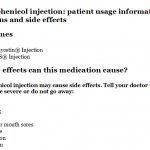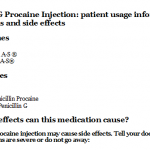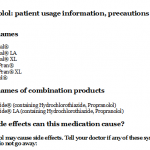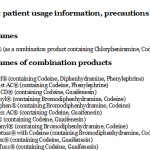
Pentazocine: patient usage information, precautions and side effects
Tuesday, May 30, 2017 by Gregory Van Dyke
http://www.naturalnewsreference.com/2017-05-30-pentazocine-patient-usage-information-precautions-and-side-effects.html
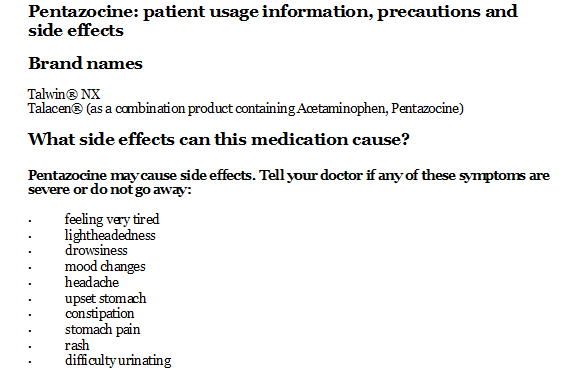
Pentazocine: patient usage information, precautions and side effects
Brand names
Talwin® NX
Talacen® (as a combination product containing Acetaminophen, Pentazocine)
What side effects can this medication cause?
Pentazocine may cause side effects. Tell your doctor if any of these symptoms are severe or do not go away:
-
feeling very tired
-
lightheadedness
-
drowsiness
-
mood changes
-
headache
-
upset stomach
-
constipation
-
stomach pain
-
rash
-
difficulty urinating
Some side effects can be serious. If you experience any of the following symptoms, call your doctor immediately:
-
difficulty breathing
-
changes in heartbeat
-
agitation, hallucinations (seeing things or hearing voices that do not exist), fever, sweating, confusion, fast heartbeat, shivering, severe muscle stiffness or twitching, loss of coordination, nausea, vomiting, or diarrhea
-
nausea, vomiting, loss of appetite, weakness, or dizziness
-
inability to get or keep an erection
-
irregular menstruation
-
decreased sexual desire
-
fainting
Pentazocine may cause other side effects. Call your doctor if you have any unusual problems while you are taking this medication.
If you experience a serious side effect, you or your doctor may send a report to the Food and Drug Administration’s (FDA) MedWatch Adverse Event Reporting program online (http://www.fda.gov/Safety/MedWatch) or by phone (1-800-332-1088).
IMPORTANT WARNING:
Pentazocine tablets should be taken by mouth. Do not try to dissolve and inject the tablets. Injecting pentazocine may cause serious health problems or death. Naloxone is added to the tablets so that people who inject dissolved tablets will not experience the desired effects of pentazocine.
Taking certain medications other medications with pentazocine may increase the risk that you will develop serious or life-threatening breathing problems, sedation, or coma. Tell your doctor and pharmacist if you are taking or plan to take any of the following medications: benzodiazepines such as alprazolam (Xanax), chlordiazepoxide (Librium), clonazepam (Klonopin), diazepam (Diastat, Valium), estazolam, flurazepam, lorazepam (Ativan), oxazepam, temazepam (Restoril), and triazolam (Halcion); medications for mental illness, nausea, or pain; muscle relaxants; sedatives; sleeping pills; or tranquilizers. Your doctor may need to change the doses of your medication and will monitor you carefully. If you take pentazocine with any of these medications and you develop any of the following symptoms, call your doctor immediately or seek emergency medical care: unusual dizziness, lightheadedness, extreme sleepiness, slowed or difficult breathing, or unresponsiveness. Be sure that your caregiver or family members know which symptoms may be serious so they can call the doctor or emergency medical care if you are unable to seek treatment on your own.
Drinking alcohol, taking prescription or nonprescription medications that contain alcohol, or using street drugs during your treatment with pentazocine increases the risk that you will experience these serious, life-threatening side effects. Do not drink alcohol, take prescription or nonprescription medications that contain alcohol, or use street drugs during your treatment.
Why is this medication prescribed?
Pentazocine is used to relieve moderate to severe pain. Pentazocine is in a class of medications called opiate (narcotic) analgesics. It works by changing the way the brain and nervous system respond to pain.
How should this medicine be used?
Pentazocine comes as a tablet to take by mouth. It usually is taken every 3 to 4 hours as needed. Follow the directions on your prescription label carefully, and ask your doctor or pharmacist to explain any part you do not understand. Take pentazocine exactly as directed.
Pentazocine can be habit-forming. Do not take a larger dose, take it more often, or for a longer period than prescribed by your doctor.
Other uses for this medicine
This medication may be prescribed for other uses; ask your doctor or pharmacist for more information.
What special precautions should I follow?
Before taking pentazocine,
-
tell your doctor and pharmacist if you are allergic to pentazocine, naloxone, any other medications, or any of the ingredients in pentazocine tablets. Ask your doctor or pharmacist for a list of the ingredients.
-
tell your doctor and pharmacist what prescription and nonprescription medications, vitamins, nutritional supplements, and herbal products you are taking or plan to take. Be sure to mention any of the following: cyclobenzaprine (Amrix); dextromethorphan (found in many cough medications; in Nuedexta); lithium (Lithobid); medications for migraine headaches such as almotriptan (Axert), eletriptan (Relpax), frovatriptan (Frova), naratriptan (Amerge), rizatriptan (Maxalt), sumatriptan (Alsuma, Imitrex, in Treximet), and zolmitriptan (Zomig); medications for cough, cold, or allergies; 5HT3 serotonin blockers such as alosetron (Lotronex), dolasetron (Anzemet), granisetron (Kytril), ondansetron (Zofran, Zuplenz), or palonosetron (Aloxi); selective serotonin-reuptake inhibitors such as citalopram (Celexa), escitalopram (Lexapro), fluoxetine (Prozac, Sarafem, in Symbyax), fluvoxamine (Luvox), paroxetine (Brisdelle, Prozac, Pexeva), and sertraline (Zoloft); serotonin and norepinephrine reuptake inhibitors such as desvenlafaxine (Khedezla, Pristiq), duloxetine (Cymbalta), milnacipran (Savella), and venlafaxine (Effexor); trazodone (Oleptro); and tricyclic antidepressants (‘mood elevators’) such as amitriptyline, clomipramine (Anafranil), desipramine (Norpramin), doxepin (Silenor), imipramine (Tofranil), nortriptyline (Pamelor), protriptyline (Vivactil), and trimipramine (Surmontil). Also tell your doctor or pharmacist if you are taking or receiving any of the following medications or have stopped taking them within the past two weeks: monoamine oxidase (MAO) inhibitors such as isocarboxazid (Marplan), linezolid (Zyvox), methylene blue, phenelzine (Nardil), rasagiline (Azilect), selegiline (Emsam, Eldepryl, Zelapar), and tranylcypromine (Parnate). Many other medications may also interact with pentazocine, so be sure to tell your doctor about all the medications you are taking, even those that do not appear on this list. Your doctor may need to change the doses of your medications or monitor you carefully for side effects.
-
tell your doctor what herbal products you are taking, especially St. John’s wort and tryptophan.
-
tell your doctor if you have or have ever had liver or kidney disease; a history of alcoholism or seizure disorders; lung or thyroid disease; heart disease; prostatic hypertrophy; or biliary or urinary problems.
-
tell your doctor if you are pregnant, plan to become pregnant, or are breastfeeding. If you become pregnant while taking pentazocine, call your doctor.
-
you should know that this medication may decrease fertility in men and women. Talk to your doctor about the risks of taking pentazocine.
-
talk to your doctor about the safe use of this medication if you are 65 years of age or older. Older adults should not usually take pentazocine because it is not as safe as other medications that can be used to treat the same condition.
-
if you are having surgery, including dental surgery, tell the doctor or dentist that you are taking pentazocine.
-
you should know that this medication may make you drowsy. Do not drive a car or operate machinery until you know how this medication affects you.
What special dietary instructions should I follow?
Unless your doctor tells you otherwise, continue your normal diet.
What should I do if I forget a dose?
This medication usually is taken as needed. If your doctor has told you to take pentazocine regularly, take the missed dose as soon as you remember it. However, if it is almost time for the next dose, skip the missed dose and continue your regular dosing schedule. Do not take a double dose to make up for a missed one.
What should I know about storage and disposal of this medication?
Keep this medication in the container it came in, tightly closed, and out of reach of children. Store it at room temperature and away from excess heat and moisture (not in the bathroom).
Unneeded medications should be disposed of in special ways to ensure that pets, children, and other people cannot consume them. However, you should not flush this medication down the toilet. Instead, the best way to dispose of your medication is through a medicine take-back program. Talk to your pharmacist or contact your local garbage/recycling department to learn about take-back programs in your community. See the FDA’s Safe Disposal of Medicines website (http://goo.gl/c4Rm4p) for more information if you do not have access to a take-back program.
In case of emergency/overdose
In case of overdose, call your local poison control center at 1-800-222-1222. If the victim has collapsed or is not breathing, call local emergency services at 911.
What other information should I know?
Keep all appointments with your doctor and laboratory. Your doctor may order certain lab tests to check your body’s response to pentazocine.
Before having any laboratory test (especially those that involve methylene blue), tell your doctor and the laboratory personnel that you are taking pentazocine.
Do not let anyone else take your medication. Pentazocine is a controlled substance. Prescriptions may be refilled only a limited number of times; ask your pharmacist if you have any questions.
It is important for you to keep a written list of all of the prescription and nonprescription (over-the-counter) medicines you are taking, as well as any products such as vitamins, minerals, or other dietary supplements. You should bring this list with you each time you visit a doctor or if you are admitted to a hospital. It is also important information to carry with you in case of emergencies.
Why is this medication prescribed?
How should this medicine be used?
What special precautions should I follow?
What special dietary instructions should I follow?
What should I do if I forget a dose?
What side effects can this medication cause?
What should I know about storage and disposal of this medication?
Tagged Under: Tags: chemical medicine, medication, Pharma, Prescription Medicine

